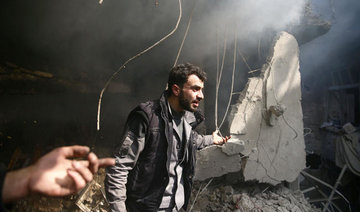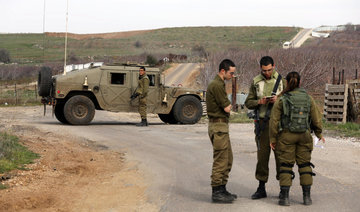JERUSALEM/ANKARA: Israel’s prime minister said on Sunday his country delivered “severe blows” to Iranian and Syrian forces and vowed to take further action against its adversaries following the most serious Israeli engagement in Syria since the war there erupted almost seven years ago.
Benjamin Netanyahu’s tough words to his Cabinet came a day after Israel carried out a wave of airstrikes in Syria. Israel ordered the airstrikes after it intercepted an Iranian drone that had infiltrated its airspace, and an Israeli F-16 was downed upon its return from Syria
“Yesterday we dealt severe blows to the Iranian and Syrian forces,” Netanyahu said. “We made it unequivocally clear to everyone that our rules of action have not changed one bit. We will continue to strike at every attempt to strike at us. This has been our policy and it will remain our policy.”
As the Syrian war winds down, Israeli officials have voiced increasing alarm that Iran and its Shiite allies are establishing a permanent presence in Syria that could turn its aim toward Israel.
Israeli leaders said the airstrikes had sent a clear message to Iran.
“We do not just talk, we act,” said Cabinet Minister Yoav Galant, a former Israeli deputy chief of staff and member of Netanyahu’s Security Cabinet.
“I think that also the Syrians now understand well the fact that they are hosting the Iranians on Syrian soil harms them,” he told The Associated Press.
Saturday’s airstrikes marked the toughest Israeli aerial assault in Syria in decades.
The Syrian Observatory for Human Rights, which monitors the war in Syria through a network of activists on the ground, said Sunday that at least six Syrian troops and allied militiamen were killed in the airstrikes. The six included Syrian and non-Syrian allied troops, the Britain-based Observatory said.
“They, and we, know what we hit and it will take them some time for them to digest, understand and ask how Israel knew how to hit those sites,” Israel’s Intelligence Minister Israel Katz told the Army Radio station. “These were concealed sites and we have intelligence agencies and the ability to know everything that is going on there and yesterday we proved that.”
In Saturday’s attacks, the Israeli jets came under heavy Syrian anti-aircraft fire and the pilots of one of the F-16s had to eject before the plane crashed in northern Israel. One pilot was seriously wounded and the other one lightly.
Iranian President Hassan Rouhani, addressing flag-waving crowds on central Tehran’s Azadi (Freedom) Square, made no specific reference to Israel’s airstrikes in Syria on Saturday which it said were aimed at air defense and Iranian targets.
But he told the crowd: “They (US and Israel) wanted to create tension in the region ... they wanted to divide Iraq, Syria ... They wanted to create long-term chaos in Lebanon but ... but with our help their policies failed.”
Earlier, hundreds of thousands of Iranians rallied on Sunday to mark the anniversary of Iran’s 1979 revolution, denouncing the US and Israel as oppressors.
Iran backs Syria’s Bashar Assad in the civil war, supports militias in Iraq, Houthi rebels in Yemen and Lebanon’s Hezbollah.
UN urges de-escalation
UN Secretary-General Antonio Guterres on Saturday called for an immediate de-escalation in Syria after Israel carried out raids inside the war-torn country.
Guterres is “following closely the alarming military escalation throughout Syria and the dangerous spillover across its borders,” UN spokesman Stephane Dujarric said in a statement.
“He calls on all to work for an immediate and unconditional de-escalation of violence and exercise restraint,” Dujarric said.
Turkish soldier killed
The Turkish military has announced the death of another soldier in Ankara’s operation against a Syrian Kurdish militia in northern Syria.
Sunday’s announcement brings to 31 the number of Turkish soldiers killed since the operation against the Syrian Kurdish militia started on Jan. 20 with Ankara’s cross-border incursion into the enclave of Afrin. Saturday was the deadliest single day for Turkey, with 11 Turkish soldiers killed.
The military’s statement says the soldier died in clashes with the Syrian Kurdish group known as the People’s Protection Units, or YPG. Turkey considers the YPG to be “terrorists” and claims it is linked to an outlawed Kurdish insurgent group operating within Turkey’s own borders.
Israeli PM: Airstrikes dealt ‘severe blows’ to Iran, Syria
Israeli PM: Airstrikes dealt ‘severe blows’ to Iran, Syria

Israeli strikes hit Yemen’s Sanaa and Hodeidah, Houthis’ Al Masirah TV says

- Houthis said that multiple air raids targeted an airport, military air base and a power station in Yemen
JERUSALEM: Multiple air raids hit several targets in Houthi-held areas of Yemen on Thursday, witnesses and the militia said, with their media saying Israel launched the strikes.
Sanaa airport and the adjacent Al-Dailami base were targeted along with a power station in Hodeida, in attacks that the Houthis’ Al-Masirah TV channel called “Israeli aggression.”
There was no immediate comment from Israel on the strikes, which come a day after Yemen fired a ballistic missile and two drones at Israel.
On Saturday, a Houthi missile attack left 16 people wounded in Tel Aviv.
Saturday’s incident had prompted a warning from Israeli Prime Minister Benjamin Netanyahu, who said he had ordered the destruction of Houthi infrastructure.
“I have instructed our forces to destroy the infrastructure of Houthis because anyone who tries to harm us will be struck with full force,” Netanyahu said in parliament.
“We will continue to crush the forces of evil with strength and ingenuity, even if it takes time.”
Syria authorities say torched 1 million captagon pills

DAMASCUS: Syria’s new authorities torched a large stockpile of drugs on Wednesday, two security officials told AFP, including one million pills of captagon, whose industrial-scale production flourished under ousted president Bashar Assad.
Captagon is a banned amphetamine-like stimulant that became Syria’s largest export during the country’s more than 13-year civil war, effectively turning it into a narco state under Assad.
“We found a large quantity of captagon, around one million pills,” said a balaclava-wearing member of the security forces, who asked to be identified only by his first name, Osama, and whose khaki uniform bore a “public security” patch.
An AFP journalist saw forces pour fuel over and set fire to a cache of cannabis, the painkiller tramadol, and around 50 bags of pink and yellow captagon pills in a security compound formerly belonging to Assad’s forces in the capital’s Kafr Sousa district.
Captagon has flooded the black market across the region in recent years, with oil-rich Saudi Arabia a major destination.
“The security forces of the new government discovered a drug warehouse as they were inspecting the security quarter,” said another member of the security forces, who identified himself as Hamza.
Authorities destroyed the stocks of alcohol, cannabis, captagon and hashish in order to “protect Syrian society” and “cut off smuggling routes used by Assad family businesses,” he added.
Syria’s new Islamist rulers have yet to spell out their policy on alcohol, which has long been widely available in the country.
Since an Islamist-led rebel alliance toppled Assad on December 8 after a lightning offensive, Syria’s new authorities have said massive quantities of captagon have been found in former government sites around the country, including security branches.
AFP journalists in Syria have seen fighters from Islamist group Hayat Tahrir Al-Sham (HTS) set fire to what they said were stashes of captagon found at facilities once operated by Assad’s forces.
Security force member Hamza confirmed Wednesday that “this is not the first initiative of its kind — the security services, in a number of locations, have found other warehouses... and drug manufacturing sites and destroyed them in the appropriate manner.”
Maher Assad, a military commander and the brother of Bashar Assad, is widely accused of being the power behind the lucrative captagon trade.
Experts believe Syria’s former leader used the threat of drug-fueled unrest to put pressure on Arab governments.
A Saudi delegation met Syria’s new leader Ahmed Al-Sharaa in Damascus on Sunday, a source close to the government told AFP, to discuss the “Syria situation and captagon.”
Jordan in recent years has also cracked down on the smuggling of weapons and drugs including captagon along its 375-kilometer (230-mile) border with Syria.
Jordan says 18,000 Syrians returned home since Assad’s fall

AMMAN: About 18,000 Syrians have crossed into their country from Jordan since the government of Bashar Assad was toppled earlier this month, Jordanian authorities said on Thursday.
Interior Minister Mazen Al-Faraya told state TV channel Al-Mamlaka that “around 18,000 Syrians have returned to their country between the fall of the regime of Bashar Assad on December 8, 2024 until Thursday.”
He said the returnees included 2,300 refugees registered with the United Nations.
Amman says it has hosted about 1.3 million Syrians who fled their country since civil war broke out in 2011, with 650,000 formally registered with the United Nations.
Lebanon hopes for neighborly relations in first message to new Syria government

- Lebanon’s Iran-backed Hezbollah played a major part propping up Syria’s ousted President Bashar Assad through years of war
- Syria’s new Islamist de-facto leader Ahmed Al-Sharaa is seeking to establish relations with Arab and Western leaders
DUBAI: Lebanon said on Thursday it was looking forward to having the best neighborly relations with Syria, in its first official message to the new administration in Damascus.
Lebanese Foreign Minister Abdallah Bou Habib passed the message to his Syrian counterpart, Asaad Hassan Al-Shibani, in a phone call, the Lebanese Foreign Ministry said on X.
Lebanon’s Iran-backed Hezbollah played a major part propping up Syria’s ousted President Bashar Assad through years of war, before bringing its fighters back to Lebanon over the last year to fight in a bruising war with Israel – a redeployment which weakened Syrian government lines.
Under Assad, Hezbollah used Syria to bring in weapons and other military equipment from Iran, through Iraq and Syria and into Lebanon. But on Dec. 6, anti-Assad fighters seized the border with Iraq and cut off that route, and two days later, Islamist militants captured the capital Damascus.
Syria’s new Islamist de-facto leader Ahmed Al-Sharaa is seeking to establish relations with Arab and Western leaders after toppling Assad.
Iraqi intelligence chief discusses border security with new Syrian administration

BAGHDAD: An Iraqi delegation met with Syria’s new rulers in Damascus on Thursday, an Iraqi government spokesman said, the latest diplomatic outreach more than two weeks after the fall of Bashar Assad’s rule.
The delegation, led by Iraqi intelligence chief Hamid Al-Shatri, “met with the new Syrian administration,” government spokesman Bassem Al-Awadi told state media, adding that the parties discussed “the developments in the Syrian arena, and security and stability needs on the two countries’ shared border.”
















